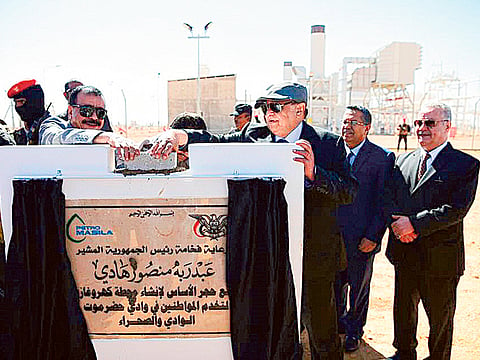Hadi visits oilfield, vows to boost production
Cash-strapped government sold 3m barrels of crude in July and used its profits to renovate dormant oilfields

Al Mukalla: Yemen President Abd Rabbo Mansour Hadi on Tuesday visited major a state-run oil company that manages oilfields in the province of Hadramout and ordered its officials to work hard to increase production.
The state-run Saba news agency reported that Hadi and senior officials visited PetroMasila company on Hadramout’s large plateau and laid the foundation stone of a 25MW natural gas power station that would put an end to long power cuts in Wadi Hadramout.
Oil production from all major fields in Hadramout, Shabwa and Marib were suspended early last year when the country descended into anarchy during Al Houthi’s rapid military expansion.
As a result of the power vacuum, Al Qaida was able to overrun many provinces in Yemen’s south.
During their occupation, local tribes managed to secure the vital oilfields in the coastal regions of Hadramout.
The cash-strapped government sold 3 million barrels of crude in July and used some of its profits to renovate dormant oilfields in order to boost production to meet its past levels.
Earlier this week Hadi visited Al Mukalla, the capital of Hadramout province, for the first time since April and is currently touring other liberated provinces in southern Yemen.
Meanwhile in the north, a government official told Gulf News on Wednesday that army troops backed by local tribesmen launched an offensive on Al Houthis’ last pockets in Marib’s Serwah district.
“The attack focused on Al Houthi military locations in Hilan and Al Makhdara regions under heavy bombing by the Saudi-led coalition fighter jets,” the official said on condition of anonymity because he was not authorised to brief reporters.
Similarly, other army troops killed at least two dozen Al Houthi fighters and arrested many others in the province of Shawba during an ongoing offensive on the rebels’ position in Bayhan districts.
On Tuesday morning, hundreds of army troops and allied tribesman marched towards Bayhan from neighbouring Marib province and other government-controlled territories in Shawba.
They seized control of strategic mountains and are currently battling the Iran-backed rebels on the western edges of Bayhan.
Rebel forces have planted thousands of mines in the battlefields to slow down the government forces’ advances.
Outside the capital, Abdullah Al Shandaqi, a government spokesman, said on Wednesday that as many as 17 Al Houthis and two Yemeni soldiers were killed in heavy clashes in the rugged district of Nehim.
Saudi-led Arab coalition fighter jets destroyed four armed vehicles carrying fighters and arms.
On Tuesday, Hadi warned that the country’s future may be reduced to “endless rounds of conflicts and wars” unless a peace deal requires Al Houthi rebels to withdraw from cities they seized and hand over weapons to the government.
Accusing US Secretary of State John Kerry of encouraging Al Houthis to evade surrender, Hadi said he won’t accept any peace agreement that doesn’t also include a power transition deal from the Gulf Cooperation Council and national reconciliation talks.
Hadi was referring to a road map that emerged after a foreign ministers’ meeting in Oman suggesting that the president transfer his authority to a vice-president agreed to by all actors, including Al Houthis. Kerry was quoted as saying Saudi Arabia, which has backed Hadi’s government, and Al Houthis had agreed on a plan to end the conflict — without mentioning the government itself.
In a message to the Yemeni people, Hadi vowed that he would not betray “the blood of free martyrs and give Yemen in to Iran and its tools, and we will not allow the sectarians and terrorists to mess up with the present and future of our Yemeni people”, according to Saba.
Hadi is fighting Al Houthis and allied forces loyal to former president Ali Abdullah Saleh.
Sign up for the Daily Briefing
Get the latest news and updates straight to your inbox



